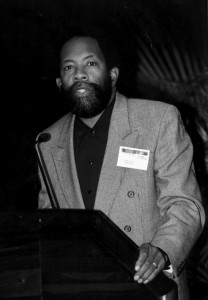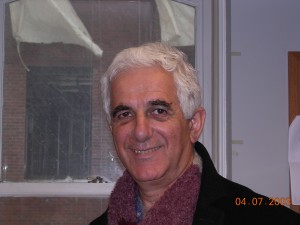 James Counts Early was born in Ocala, Florida in 1947. Early served at the Smithsonian as a folklore consultant and acting administrator the African Diaspora Folklife Festival Program before assuming the position of Assistant Secretary for Public Service at the Institution. It was in this executive position that Early supported the creation of the Jerusalem Project under the Smithsonian aegis. Early has also served as associate professor at Antioch College, Washington, D.C. and researcher at Howard University’s Institute for the Arts and Humanities. Early became the producer, writer and host of Ten Minutes Left, a weekly radio show on WHUR-FM. He hosted this program for five years while working at the National Endowment for the Humanities as a humanist administrator. Early is currently the director of cultural heritage policy at the Center for Folklife and Cultural Heritage.
James Counts Early was born in Ocala, Florida in 1947. Early served at the Smithsonian as a folklore consultant and acting administrator the African Diaspora Folklife Festival Program before assuming the position of Assistant Secretary for Public Service at the Institution. It was in this executive position that Early supported the creation of the Jerusalem Project under the Smithsonian aegis. Early has also served as associate professor at Antioch College, Washington, D.C. and researcher at Howard University’s Institute for the Arts and Humanities. Early became the producer, writer and host of Ten Minutes Left, a weekly radio show on WHUR-FM. He hosted this program for five years while working at the National Endowment for the Humanities as a humanist administrator. Early is currently the director of cultural heritage policy at the Center for Folklife and Cultural Heritage.
Author Archives: admin
Issam Nassar
Issam Nassar was born in Ramallah, Jordan in 1961. He is associate professor of History at Illinois State University and a research fellow at the Institute of Jerusalem Studies in Jerusalem. A historian of photography and the Middle East, he taught at the University of California at Berkeley, 2006, Bradley University, 2003-2006 and al-Quds University, 1998-2003. Dr. Nassar is associate editor of Jerusalem Quarterly (Arabic: Hawliyat al-Quds?) and author of a number of books and articles, among them Laqatat Mughayirah (Different Snapshots: The History of Early Local Photography in Palestine).
Amy Horowitz
Amy Horowitz was born in Washington, D.C. in 1952. She is scholar-in-residence at The Ohio State University Mershon Center for International Security Studies where she teaches in the International Studies Program. Currently she is visiting scholar at Indiana University’s Center for the Study of Global Change and the Department of Folklore and Ethnomusicology and will offer course within the Themester program in fall, 2011. Dr. Horowitz’s main research interests are Mediterranean Israeli music, cultures in disputed territories, ethnographies of contemporary Jerusalem, and protest music as responsible citizenship. Her recent book, Mediterranean Israeli Music and the Politics of the Aesthetic won honorable mention in the Association of Jewish Studies Jordan Schnitzer Book Award in 2010. Dr. Horowitz served as assistant and acting director of Smithsonian Folkways Recordings, where she won a Grammy as co-producer of The Anthology of American Folk Music.
Salim Tamari
Salim Tamari was born in Jaffa in 1945 but had to flee the city with his family in 1948.  He is the director of the Institute for Jerusalem Studies, editor of the Jerusalem Quarterly and associate professor of sociology at Birzeit University. Tamari co-directs Birzeit’s Mediterranean Studies Unit. He was a visiting fellow at the Aga Khan Program for Islamic Architecture at MIT and is currently the Visiting Arcapita Professor at Columbia University. His research draws heavily on archival materials and personal diaries to examine the social and political forces that shaped and re-shaped Palestine in the 20th century. He is author of “Jerusalem 1948: The Arab Neighborhoods and Their Fate in the War,” “Palestinian Refugee Negotiations: From Madrid to Oslo II,” and most recently, “Mountain against the Sea: Essays on Palestinian Society and Culture,” published in 2008 by the University of California Press. Dr. Tamari served on the refugee committee in the multilateral peace talks that began in the wake of the 1991 Madrid Peace Conference.
He is the director of the Institute for Jerusalem Studies, editor of the Jerusalem Quarterly and associate professor of sociology at Birzeit University. Tamari co-directs Birzeit’s Mediterranean Studies Unit. He was a visiting fellow at the Aga Khan Program for Islamic Architecture at MIT and is currently the Visiting Arcapita Professor at Columbia University. His research draws heavily on archival materials and personal diaries to examine the social and political forces that shaped and re-shaped Palestine in the 20th century. He is author of “Jerusalem 1948: The Arab Neighborhoods and Their Fate in the War,” “Palestinian Refugee Negotiations: From Madrid to Oslo II,” and most recently, “Mountain against the Sea: Essays on Palestinian Society and Culture,” published in 2008 by the University of California Press. Dr. Tamari served on the refugee committee in the multilateral peace talks that began in the wake of the 1991 Madrid Peace Conference.
Galit Hasan-Rokem
Galit Hasan-Rokem, is Max and Margarethe Grunwald Professor of Folklore and Professor (emerita) of Hebrew Literature at the Hebrew University of Jerusalem. She studies folk literary and ethnographic aspects of classical late antique Rabbinic literature and its inter-cultural and inter-religious aspects; folklore and literary theory; the proverb genre; Jewish motifs in European folklore, especially the traditions on the Wandering Jew and contemporary Israeli culture. Her books include: Web of Life: Folklore and Midrash in Rabbinic Literature (2000), and Tales of the Neighborhood: Jewish Narrative Dialogues in Late Antiquity (2003) and the edited volumes: The Wandering Jew – Essays in the Interpretation of a Christian Legend co-edited with A. Dundes (1986); Untying the Knot – On Riddles and Other Enigmatic Modes with D.D. Shulman (1996); and with Regina F. Bendix the Wiley and Blackwell Companion to Folklore (2012). She is a founding Editorial Board member of Palestine-Israel Journal where she has published e.g. the essay: “Not the Mother of All Cities: a Feminist Perspective of Jerusalem” [read]. Her essay “Martyr vs. Martyr – The Sacred Language of Violence”, originally published in 2003 was anthologized in A Reader in the Anthropology of Religion, edited by Michael Lambek. Malden MA: Blackwell 2008 (2nd edition):590-595.
Week 2: Sept 7
Dumper, Mick. “Jerusalem: Then and Now”
Khaladi, Rashid. “The History of Jerusalem”
Rubin, Rehav. “Jerusalem: The Holy City through the Ages”
Pressman, Jeremy. “A Brief History of the Arab-Israeli Conflict,”
Week 1 Readings: Aug 29-31
Welcome
Welcome to the home of Living Jerusalem Project
